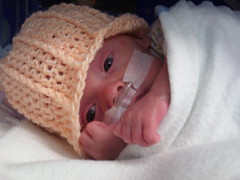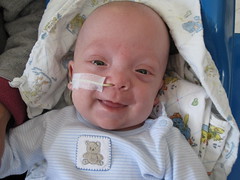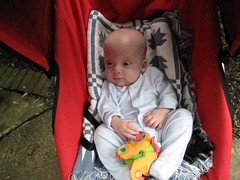Carolyn and I started this blog in late November, a month after the twins were born and we first walked into the NICU. By that time we were battle-scarred veterans of the NICU. I sat down recently and tried to remember what my very first impressions were, back before I knew how the whole place operated.
The NICU is the intensive-care unit for babies, which is why you're so surprised when you walk in and find no babies. Instead you see big machines, flashing lights, and alarms. You see a lot of nurses and doctors. No-one wears a lab coat, so it's hard to tell the nurses from the doctors. You examine the machines: they form clusters around single lucite boxes. Many of the boxes are covered in heavy cloth, veiling the mysteries within. Some have their covers thrown back. The boxes remind you of the apparatuses you've seen in the movies for dealing with plutonium or deadly viruses. They're pressure sealed, with openings only for gloved hands. Above the box you see a computer screen giving five or six real-time statistics; sometimes the screen is flashing and emitting an alarm. Next to the box is a pole stacked with drug pumps; each pump leads into a tube, and the tubes all snake into the box through cunning gaskets. You approach a box and feel the heat and humidity leaking out: the insides of the boxes are simulating the uterine environment but of course you know they can't. You peer inside a box. Maybe there's an ultraviolet light on over the box, bathing everything with a strong blue glow. You see other machines inside the box. A respirator. Maybe more monitors. You see the IV lines running inside. You see wires running to the monitors. You see an oxygen hose. They all gravitate towards a scrap of flesh pierced in several places by lines of various kinds. It's a baby, this scrap of flesh. You notice a diaper, the smallest you've ever seen. It looks too big and also out of place inside the lucite box. You stare at the tiny baby. If the UV light is on, the baby is wearing pads taped over its eyes. If it is on a powerful respirator, it is wearing earmuffs to protect it from the noise. You get a sense of the power of medicine bending towards this baby, energy is flowing in through the IVs, the oxygen hose, even the monitor leads; the doctors and nurses are studying the machines and making minute adjustments to drugs, respirator, oxygen mix. They leave nothing to chance, they measure and react to every chemical or physical process inside the baby that is available to them. The doctors don't look at the baby; there's not a lot to see. Its secrets are being displayed in real time on the monitors. You imagine this is what a nuclear power plant's control room must feel like. You wash your hands one last time and squirt on some alcohol hand cleanser for good measure. A nurse pushes on one of the box's openings; it hisses and then you feel the heat and humidity wash out as the little door opens. There's a smell like a car that's been sitting in a sunny parking lot. The respirator is louder now, and you understand why the baby is wearing earmuffs. They tell you that preemies don't like to be stroked, they prefer steady pressure. You reach in and look for something not pierced by a line, obscured by a ventilator or covered in monitors held on by sticky tape. It takes you a second to realize that you're looking at a hand, sticking out from the end of an arm taped to a board and studded with IV lines. This is the baby's hand. You tentatively grasp it. The fingers all curl around just one of your fingers. You realize your mistake. You are holding the engine; the machines around you draw their power from it. The doctors tell you that all preemies develop their lungs, get their intestines working, get their brains organized (even if these systems don't wind up working all that well in the long run). The doctors aren't sure how they do this. But the hand you hold is boiling with energy. You sense how far away this baby is from the world, and how fast it is rushing back. It is somewhere in a hostile environment, but it isn't lost; it knows where it's going and it's moving so fast that all the machines and doctors can barely keep up. You hope that it will make it home before it succumbs to the deadly hazards it is moving through. You know it will never give up, even until the end. So how can you?
skip to main |
skip to sidebar

Max was born in October 2008 at Georgetown University Hospital. After more than four months at GUH, Max moved to the HSC Pediatric Center in March 2009. He came home six months after he was born, in April 2009.
A TUBE-FREE MORNING

Start Here: A list of posts with background information
- We're home! (leaving the hospital with Max)
- The hospital at home (what it's like to care for Max at home)
- Max in action (see Max do his tricks)
- How is Max? (update April 2009)
Most recent photos of Max
Blog Archive
-
▼
2008
(100)
-
▼
December
(69)
- Evening update (Wednesday 12/31)
- Evening update (Tuesday 12/30)
- Morning update (Tuesday 12/30)
- Max's first report card (Monday 12/29)
- Evening Update (Sunday 12/28)
- Playing Possum
- Evening update (Saturday 12/27)
- Max in the step-down NICU
- Late night update (Friday 12/26)
- Video of Max at the NIC unit on Christmas Day
- Max in his NICU crib
- Morning update (Thursday 12/25)
- Midday update (Wednesday 12/24)
- Morning update (Wednesday 12/24)
- Evening update (Tuesday 12/23)
- How the NICU has changed us
- Late night update (Monday 12/22)
- Evening update (Monday 12/22)
- Midday update (Monday 12/22)
- Afternoon update (Sunday 12/21)
- Evening update (Saturday 12/20)
- Evening Update (Friday 12/19)
- Evening Update (Thursday 12/18)
- Morning update (Thursday 12/18)
- Evening update (Wednesday 12/17)
- Late afternoon update (Wednesday 12/17)
- Mid-morning update (Wednesday 12/17)
- Morning update (Wednesday 12/17)
- Evening update (Tuesday 12/16)
- Afternoon update (Tuesday 12/16)
- Midday update (Tuesday 12/16)
- Bonus late-night post (12/15)
- Evening Update (Monday 12/15)
- Morning update (12/15)
- Evening update (Sunday 12/14)
- Max's new home, explained
- Afternoon update (Sunday 12/14)
- Evening update (Saturday 12/13)
- Morning update (Saturday 12/13)
- Guide to Max's new environment
- Late night update (Friday 12/12)
- What is the NICU like?
- P.S. (Thursday 12/11)
- Evening update (Thursday 12/11)
- Midday update (Thursday 12/11)
- Evening update (Wednesday 12/10)
- Midday update (Wednesday 12/10)
- Bonus head circumference post
- Evening update (Tuesday 12/9)
- Bonus update (Tuesday 12/9)
- Morning update (Tuesday 12/9)
- Phrenology
- Evening Update (Monday 12/8)
- Morning update (Monday 12/8)
- Evening update (Sunday, 12/7)
- Evening update (Saturday 12/6)
- Morning update (Saturday 12/6)
- Evening update (Friday 12/5)
- Midday update (Friday 12/5)
- Morning update (12/5)
- Evening update (Thursday, 12/4)
- How is Max?
- Morning update (Thursday 12/4)
- Evening update (Wednesday, 12/3)
- Midday update (Tuesday 12/3)
- Evening update (Tuesday 12/2): Some relief
- Midday update (Tuesday 12/2)
- Evening update (Monday 12/1)
- Midday update (Monday 12/1): Bring on the prune juice
-
▼
December
(69)



